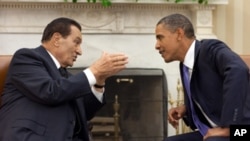The Obama administration is openly supporting the rights of demonstrators in political unrest in the Middle East that threatens the Egyptian government and others that have been key strategic allies of the United States.
The tone of the U.S. approach was set by President Obama himself in an appearance Thursday on the popular video website YouTube.
The president said while Egyptian President Hosni Mubarak has been a U.S. ally on critical issues including the Israeli-Palestinian peace process, the need for political reform in Egypt has long been evident and noted by the United States.
"I’ve always said to him that making sure that they are moving forward on reform, political reform, economic reform, is absolutely critical to the long-term well being of Egypt," Mr. Obama said. And you can see these pent-up frustrations that are being displayed on the streets. My main hope right now is that violence is not the answer in solving these problems in Egypt. So, the government has to be careful about not resorting to violence, and the people on the streets have to be careful about not resorting to violence," said the president.
Egypt’s peace treaty relationship with Israel has been key to U.S. regional policy, as was the political moderation of the recently ousted Tunisian government, and more recently anti-terrorism cooperation by the Yemeni government which is also facing street protests.
Former U.S. Ambassador to Morocco Marc Ginsberg, now columnist for the political website Huffington Post, says the administration strategy carries risks, noting that U.S. support for free elections among the Palestinians in 2006 brought the radical Hamas movement to power.
Daniel Brumberg, a scholar focusing on Middle East reform at the U.S. Institute of Peace in Washington, says the career of U.S. ally Hosni Mubarak is probably nearing an end. But he adds the political outcome in Egypt will not necessarily be a setback for the United States.
“What the situation does right now in Egypt is present an opportunity for reformists in the opposition, and perhaps even in the state, to make the case for a presidential election in which there are new candidates, and in which there is a real effort to open up to the opposition," Brumberg says. "That’s the opportunity.
But it’s hard to see, given the circumstances, where we can move forward in a situation where Hosni Mubarak himself runs for president and succeeds legitimately. That would be an outcome that nobody would believe at this point,” he says.
William Zartman, a North Africa scholar and emeritus professor at the Johns Hopkins University School of Advanced International Studies in Washington, says the United States is right to identify with the protestors and democratic aspirations in Egypt, despite the value of its 30-year relationship with President Mubarak.
“Mubarak is much more important to us in regard to Middle East politics and the Israeli-Palestinian question," says Zartman. "And so, we’ve been careful about our treatment of Mubarak. And we’re torn between our democratic values our need for allies. That’s something a country of the standing of the United States has to face. But I hope we more and more recognize that these [protesters] are our people.”
Zartman says the unrest that toppled the Tunisian government was a “people’s revolt” rather than an Islamic one. He said while the Islamists like the Muslim Brotherhood have been more prominent among opposition forces in Egypt, it is not pre-ordained that a post-Mubarak government in Egypt would be radical and scuttle peace with Israel.
“Its very interesting that the [Muslim] Brotherhood is now joining the protest, rather than leading the protest," Zartman points out. "And it may well benefit from the protests. But it may also be that this is not an Islamic protest in its inspiration. Would a government that comes in be as helpful to the United States in regard to the Middle East peace process? The Middle East peace process is already in such shambles, in part because of our disinterest in it. It could get worse. But it’s not as if it was a smooth-sailing ship that’s suddenly being scuttled,” he says.
The Obama administration’s approach has put other U.S. allies in the region on the defensive. Jordanian Foreign Minister Nasser Judeh, who met Secretary of State Hillary Clinton in Washington this week, cast recent demonstrations in Jordan as protests against prevailing economic conditions in the region and not the Hashemite monarchy of King Abdullah.
“I think we have to differentiate between economic hardship which we have, and also many countries around the world," said Judeh. "Jordan is not living in a bubble.It is part and parcel of the fabric of these international economies. And between political stability, which we are blessed with in Jordan, with the Hashemite leadership, his majesty the king, who initiates reform from within.”
Standing beside foreign minister Judeh, Secretary Clinton noted that international observers had rated Jordan’s parliamentary elections last November as free and fair.
Only a day before unrest drove Tunisian President Zine el Abidine Ben Ali from power two weeks ago, Clinton told a policy forum in Qatar that Arab countries risked “sinking into the sand” unless they liberalized their political systems and economies.




